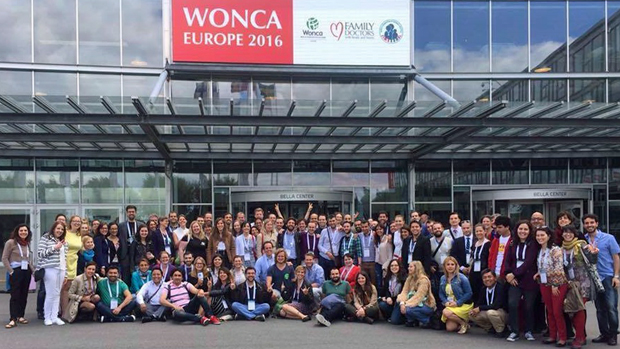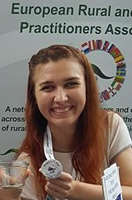Young Doctor Movements Engaging in Rural Health Policy
 Photo : VDGM doctors at WONCA Europe in Copenhagen in June.
Photo : VDGM doctors at WONCA Europe in Copenhagen in June.
Many family doctors will find themselves working in a rural area at some point during their career. This can be a daunting concept, especially for newly qualified family doctors, as many countries in Europe do not have the infrastructure in place to provide adequate healthcare in rural areas or a support network for new colleagues. An important part of this issue is engaging with policy makers to improve working conditions and health outcomes in rural areas. Doctors play a crucial role in rural communities and should be patient advocates, however, they often do not have an idea how to do this.
This was presented as a joint workshop from VdGM-EURIPA at WONCA Europe 2016 conference in Copenhagen. The aim was to get doctors thinking about ways in which they could influence policy changes to improve care for their patients and their own working conditions.
Berit Hansen presented the Praksismatch initiative, a web-based platform from the Danish Association of Trainees (FYAM). (see video) This is a platform for matching doctors with the right rural practice for them. The website provides information about the different practices and includes reviews from other doctors who have worked there. It uses questionnaires to match key elements like: organisation, cooperation, professionalism, work environment, training and demographics.
Hanna Stark presented her findings from interviewing her local policy makers in Finland. Policy makers were from different backgrounds (politicians, doctors, and other professions), age groups (30-75 years), both male and female. The thing they said were important in influencing health policy are: peer leadership, medical expertise, budget awareness, shifting focus from diseases to community health and well-being, and more GPs being involved. The levels at which policy making takes place varies from self-management and personal networking to local politics and working parties in the Ministry of Health. An interesting thing that Hanna found out was that her local decision makers preferred to be contacted directly and speaking one to one about issues that affected the healthcare of the local community.
Joana Pontes found out what the literature has to say on the conditions for young doctors coming to work in rural areas, and how they may influence their decision. Finding where grouped into 1. Professional factors, 2. Social and family factors, and 3. Community facilities, support and relationships.
Professional factors: lack of support from local hospitals or community health staff, lack of opportunity to practice procedures, lack of support from other medical workers, high workloads (Hoyal 1995; Hays et al., 1998)
Social and family factors: problems with secondary education for children, lack of occupational opportunities for the doctor’s spouse, inadequate housing, personality clashes with colleagues, jealousy by other community members of the doctor’s income, and lack of time to spend with the family (Hoyal 1995; Hays et al., 1998).
Community facilities, support and relationships: have been acknowledged as important influences on the extent to which rural doctors’ needs are satisfied. They felt they could get too close to members of the community and lose their objectivity in dealing with their medical problems. (Humphreys 2001)
Following these short presentations we had a discussion aimed at thinking about ways young doctors could get involved in influencing future rural health policy. During the discussion different ideas where expressed: forming local networks of GP’s to petition local government, existing organizations (EURIPA and Rural WONCA) to compile easily accessible resources (i.e. research articles, policy papers) which would be used by individual GP’s or local groups to influence policy makers, forming better medical education for rural medicine preferably in rural areas, supporting locals who are studying medicine to come back to their home town, learning about stakeholders and health policy during medical education.
From the ideas expressed it was clear that young doctors have an interest in helping to form future health policies that will affect both their patients and their future careers.

Author: Veronika Rasic
@DocVei
(Seen here manning the EURIPA / VDGM booth in Copenhagen)